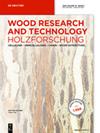腐殖化欧洲松树(Pinus sylvestris L.)微文素的光降解稳定性
IF 1.6
3区 农林科学
Q2 FORESTRY
引用次数: 0
摘要
腐植酸是一种从糖类生物精炼中提取的异构多分散呋喃大分子。近年来,通过腐植酸化来改善木材性能已成为人们关注的焦点。本研究以不同浓度的柠檬酸(CA)和琥珀酸(SA)作为反应催化剂,如 1.5%、3% 和 4.5% wt.%,考察了用腐植酸修饰的欧洲松木边材微孔的光降解稳定性。在经过 48 小时、96 小时和 144 小时的加速老化试验后,通过质量损失和有限跨度拉伸强度来评估腐殖化木材的光稳定性。结果与未改性样品和未风化样品进行了比较。傅立叶变换红外光谱显示,腐殖化改性使木材的化学结构发生了明显变化。样品的增重百分比随着催化剂浓度的增加而增加。而在水浸泡两周后,样品之间没有发现任何差异。不过,含有催化剂的腐殖质配方在很大程度上降低了风化微文素的强度损失,在风化 144 小时后,使用 1.5% 和 3% CA 改性的微文素的强度损失值分别比未改性样品低 32% 和 41%。总之,研究结果表明腐植酸具有保护木材免受光降解的巨大潜力。本文章由计算机程序翻译,如有差异,请以英文原文为准。
Photodegradation stability of huminated European pine (Pinus sylvestris L.) microveneers
Humins are heterogeneous and polydisperse furanic macromolecules derived from sugar biorefinery. Improving wood properties by humination has become of interest recently. This study examined the photodegradation stability of European pine sapwood microveneers modified with humins at different concentrations of citric acid (CA) and succinic acid (SA) as reaction catalysts, e.g., 1.5 %, 3 %, and 4.5 % wt.%. The photostability of huminated wood was assessed after 48 h, 96 h, and 144 h of exposure to the accelerated weathering test by means of mass loss and finite-span tensile strength. The results were compared with unmodified and also unweathered samples. The FT-IR spectroscopy showed apparent changes in the chemical structure of wood by humination modifications. The weight percentage gains of the samples increased with increasing the concentration of the catalyst. While no differences were observed between the samples after two weeks of the water leaching. The strength losses of weathered microveneers were, however, mostly reduced by humin-based formulas containing catalysts, where the microveneers modified with 1.5 % and 3 % CA showed respectively 32 % and 41 % lower strength loss values than the unmodified samples after 144 h of weathering. Overall, the results showed a high potential for humins to protect wood against photodegradation.
求助全文
通过发布文献求助,成功后即可免费获取论文全文。
去求助
来源期刊

Holzforschung
工程技术-材料科学:纸与木材
CiteScore
4.60
自引率
4.20%
发文量
83
审稿时长
3.3 months
期刊介绍:
Holzforschung is an international scholarly journal that publishes cutting-edge research on the biology, chemistry, physics and technology of wood and wood components. High quality papers about biotechnology and tree genetics are also welcome. Rated year after year as one of the top scientific journals in the category of Pulp and Paper (ISI Journal Citation Index), Holzforschung represents innovative, high quality basic and applied research. The German title reflects the journal''s origins in a long scientific tradition, but all articles are published in English to stimulate and promote cooperation between experts all over the world. Ahead-of-print publishing ensures fastest possible knowledge transfer.
 求助内容:
求助内容: 应助结果提醒方式:
应助结果提醒方式:


